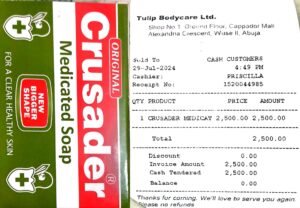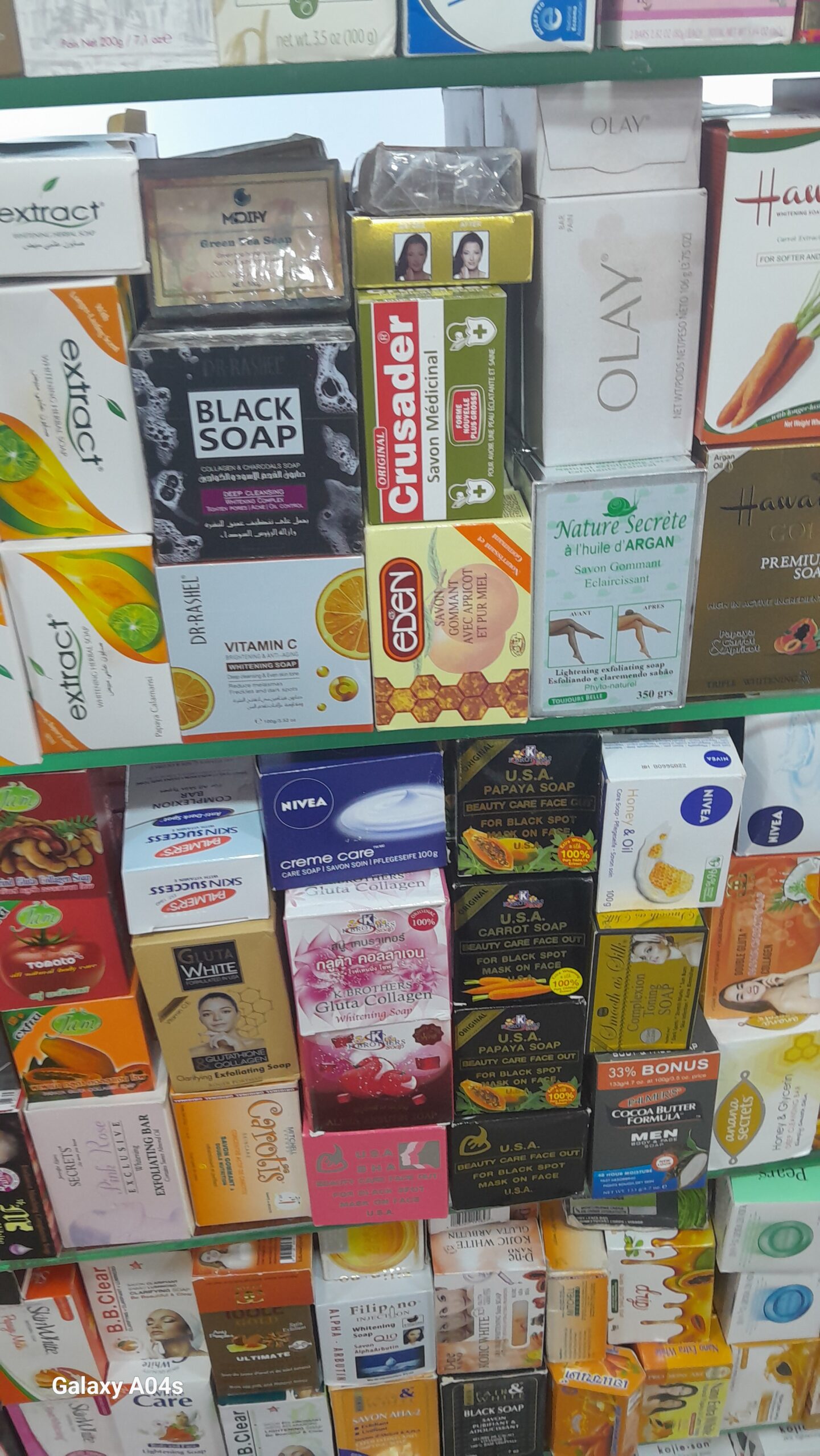Despite ban, the abuse of harmful chemicals in beauty products in open markets in Nigeria is alarming. Africa Health Report AHR, uncovers the unrestrained misuse of beauty and skin products in this investigative report by our Correspondent, Gom Mirian who spents weeks of unrelentless efforts exposing the health implications faced by unsuspecting public and unraveling the dogged zeal of unscrupulous traders in the illicit sales of these hazardous products.
Unwholesome Acts
In a nation known for its vibrant culture and diverse beauty rituals, the allure of Nigerian beauty products is undeniable. However, beneath the surface lies a disturbing secret.
Despite a ban by the National Agency for Food and Drug Administration and Control (NAFDAC), beauty products containing high volumes of mercury and hydroquinone, despite being banned by NAFDAC, are openly sold in major Nigerian markets.
The regulatory body, NAFDAC, has maintained a ban on products like Crusader soaps due to their high mercury content. However, a recent investigation by Africa Health Report (AHR) has uncovered the alarming presence of banned products such as Crusader medicated soap, Goree beauty cream, Carotone black spot removal, and B.B clear dark spot removal on the shelves of beauty product stores across Nigeria. Nigeria’s Market of Mercury-Laden Products
Africa Health Report’s (AHR) investigation has revealed a startling reality. Products such as Crusader medicated soap, which contains over 2% mercury, Goree beauty cream, boasting a staggering 17,200 ppm of mercury, carotone black spot removal creams, B.B clear, and dark spot removal solutions, are visibly displayed in markets such as Wuse Market, Kubwa Market, cosmetics stores in Lugbe, and Banex Plaza in Wuse 2. What is even more alarming is that these products are sold without any consequences for the sellers, putting the health of countless unsuspecting customers at risk.

The Zero Mercury Working Group reports that one in 10 skin lighteners contains the dangerous neurotoxin mercury.
The Human Cost
To understand the magnitude of this issue, AHR spoke to a lady, whose name has been concealed in the report to protect her identity, referred to as Ms. Oladeji, a regular user of these banned beauty products. She shared her harrowing experience of irreversible skin damage. Stating, “I never knew the beauty products I was using contained harmful chemicals like mercury.

“I thought beauty was just skin deep. Little did I know that these products, which promised to enhance my complexion, would leave me with lifelong scars.
“I started experiencing skin red rashes and discolouration, and my health deteriorated. My once smooth and blemish-free skin is now filled with dark spots and rashes. I never imagined the consequences could be this severe.”
She told AHR, “It’s alarming that these products are still being sold openly in the market,” Ms Oladeji expressed. “There’s no way [for consumers] to know whether [mercury] is in the creams or not because it’s not on the labels.”
Ms. Oladeji’s story is just one of a troubling trend in Abuja and across Nigeria, where women and entire households have been exposed to inorganic mercury due to prolonged use of skin whitening products that do not disclose their harmful levels of this toxic chemical.
The skin whitening industry is estimated at $8 billion worldwide and is predicted to reach $11.8 billion by 2026. Studies suggest that women account for almost 80% of sales worldwide.
Expert Opinion: Dermatologist’s Perspective
To explore the potential health risks and long-term effects of using these dangerous products, AHR consulted Dr. Uche Okonkwo, a dermatologist. Dr Okonkwo underscored the gravity of the issue:
“Mercury and hydroquinone are powerful skin-lightening agents, but their long-term consequences can be severe. Mercury is a known neurotoxin that can lead to neurological disorders, including memory problems, depression, tingling in the extremities, kidney damage, and even miscarriages in pregnant women. Hydroquinone, meanwhile, is associated with skin cancer and permanent damage to skin cells.
“Exposure to these substances can cause skin rashes, blotchy spots, and a greyish discolouration. Mercury also poses risks to the eyes and ears, potentially leading to vision and hearing issues.
“The health risks extend beyond users to their families, who might be exposed to mercury vapours or contaminated items like washcloths and towels.
“Additionally, it’s important to note that mercury can be present in various cosmetic products, including balms, lipsticks, and lip balms, not just creams and soaps.”
NAFDAC’s Stance on Maximum Allowable Limits
To understand why banned products like Crusader medicated soap and Carotone are still being openly sold without repercussions, AHR spoke with Dr. Omokpariola, the Director of Chemical Evaluation and Research at NAFDAC. He clarified the regulations concerning mercury and hydroquinone in beauty products in Nigeria.
In an interview with AHR, Dr Omokpariola said, “Under our regulations, mercury is entirely banned in beauty products in Nigeria. Any product containing mercury is strictly prohibited,” Dr. Omokpariola explained. “If we detect any beauty products with mercury, we seize them immediately, with no exceptions.
“However, we face challenges with porous borders where these banned products are smuggled into the country. Although we have conducted several seizures, some sellers have hidden warehouses where these products are stored and eventually released into the market. That’s why we have the whistleblower program in place, encouraging the public to provide credible information on where these banned products are kept so we can take action against them.”
The Ongoing Battle
However, a culture of impunity seems to prevail despite NAFDAC’s efforts. The widespread availability of these banned products suggests a lack of enforcement. Our correspondent reached out to several sellers in the aforementioned markets, but most refused to comment. One seller eventually opened up on the condition of anonymity:
“The demand for these products is high, and the profits are too tempting. As long as people are willing to buy, we will continue to sell. The consequences on their health are their responsibility.”
Global Concern: WHO’s Warning on Mercury
The World Health Organization (WHO) has identified mercury as one of the top ten chemicals of major public health concern. Mercury in cosmetics poses a significant threat to public health, with detrimental effects on vital organs and overall well-being. The Minamata Convention on Mercury, a global agreement adopted in 2013, underscores the urgent need to eliminate mercury-containing products from the market.
The Minamata Convention on Mercury is a global agreement, which was adopted in 2013 and entered into force on the 16th of August 2017. The Minamata convention bans the sale of mercury-added cosmetics, including skin-lightening creams. After 2020, parties to the convention, including Nigeria which is a signatory to the convention, must have banned the manufacture, import and export of mercury-containing cosmetics products.
The presence of mercury and hydroquinone in beauty products sold openly in Nigerian markets is a grave public health concern. Consumers, often unaware of the risks involved, continue to fall victim to the enticing promises of these banned products. The time has come for NAFDAC to strengthen their regulatory measures, ensure rigorous enforcement, and educate the public, raising awareness about the health implications of using these dangerous beauty products. Only then can we hope to create a safe beauty industry in Nigeria, where pursuing beauty does not come at the cost of people’s lives.



